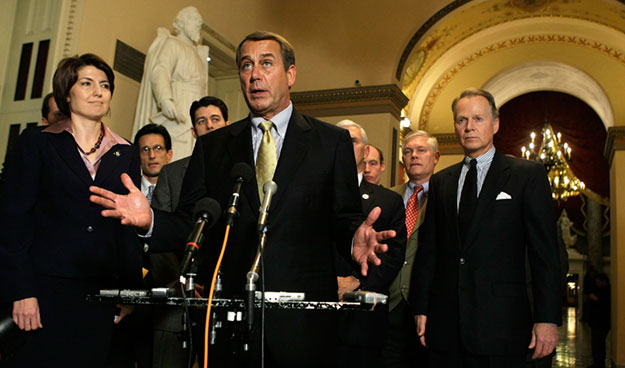Republicans have been getting a lot of advice on how they should change their party ever since Mitt Romney’s defeat in November 2012. They need it.
Videos by Rare
They are in more than the usual disarray that afflicts parties out of the White House. Many members of their majority in the House of Representatives are out of step with the Republican leadership on issues ranging from Syria to defunding Obamacare.
They have a clutch of presidential candidates who are little known nationally and take starkly different stands on issues. Any recent uptick in polls represents more a rejection of the Obama Democrats than an embrace of their opponents.
So, Republicans would do well to listen to advice, even from unlikely political quarters and from the far corners of the earth. Two articles in the past week warrant attention, even though they seem to propose opposite courses.
In one corner are William Galston and Elaine Kamarck, Democrats who held top jobs in the Clinton White House, writing in The Washington Post.
They point back to their 1989 manifesto, “The Politics of Evasion: Democrats and the Presidency.” Democrats suffered, they argued, from mistaken beliefs that they could win the presidency by some combination of liberal orthodoxy and mobilizing core constituencies.
They argued that Democrats’ previous victories in congressional and state elections wouldn’t continue indefinitely, as conservative southerners would start to vote Republican.
Their analysis proved prescient. Bill Clinton, campaigning as a New Democrat, captured the White House in 1992. And Republicans finally broke through and won a majority in the House in 1994.
Today, they say, Republicans stand where Democrats did in 1989. They need to be more moderate.
They should reject “hyper-individualistic libertarianism,” “mean-spirited words” and (in an uncharacteristically nasty analogy) “the tea party’s Wahhabi-style drive to restore pure, uncompromised conservatism.”
A different recommendation comes from overseas. British parliamentarian Douglas Carswell, in a Telegraph blogpost, interprets the Sept. 8 victory of Tony Abbott and his center-right Liberal Party in Australia as a vote for full-throated conservatism.
Abbott opposes abortion and same-sex marriage; he is a skeptic on global warming; and he wants to end immigration of asylum-seekers. The left-wing Oz commentariat said that made him unelectable. Yet he won big.
Carswell’s advice to British Conservatives and, by implication, American Republicans is to “stop drifting to the soggy center.” Tony Abbott shows you can win.
So which is it — go moderate or go bold? My reading is that there’s not as much conflict as initially appears. One reason is that the analogies go only so far.
Galston and Kamarck surely understand that Republicans aren’t in as bad shape as Democrats were in 1989. Then Democrats had lost the presidential popular vote in the last six elections by an average of 10 percent. The corresponding figure for Republicans today is 4 percent.
Moreover, Republicans have won House majorities in eight of the last 10 elections, on platforms similar to that of their presidential candidates. The party faces challenges but not doom.
And of course Australia is not the United States. Abbott was helped by ferocious splits in the governing Labor Party. Nothing similar is happening, yet, with America’s Democrats.
I think the American Democrats and the British Conservatives are offering similar advice in two respects.
Run on the issues of tomorrow, they say, not the issues of yesterday. Kamarck and Galston note that many Republicans offer policies modeled on Ronald Reagan’s. But the country faces different problems today.
In Australia, Abbott did not run on the platform of 1996-2007 Liberal Prime Minister John Howard. He called for an expensive parental leave program to encourage childbearing, for example.
Most of all — and here is the second point of agreement — the center-right victories in Australia and in Norway two days later owe much to the unpopularity of center-left government policies.
Abbott promised to repeal Labor’s carbon tax. Norway’s Ema Solberg called for business-friendly reforms to produce the economic growth necessary for an expensive welfare state.
There is no shortage of unpopular Obama policies. Obamacare, for starters, is unpopular and may be headed for a train wreck when it goes into effect next month. Blocking the Keystone pipeline irritates most everyone except hardline environmentalists. Then there’s — James Carville’s phrase — the economy, stupid. Big government isn’t working as promised.
Republicans need to present attractive policies that address future needs. Good policy, more than ideological positioning, is the key to political success.
Michael Barone, senior political analyst for The Washington Examiner, is a resident fellow at the American Enterprise Institute, a Fox News Channel contributor and a co-author of The Almanac of American Politics.
© THE WASHINGTON EXAMINER
DISTRIBUTED BY CREATORS.COM



